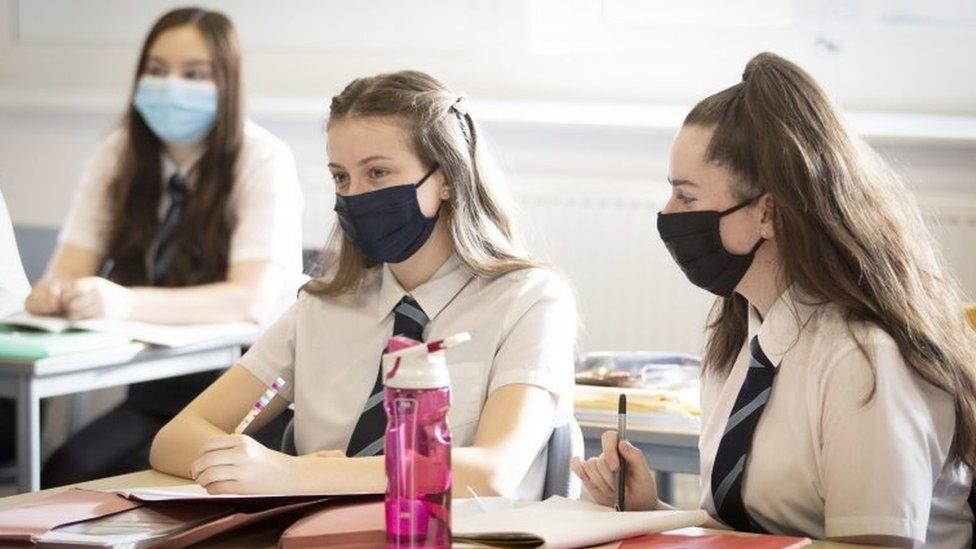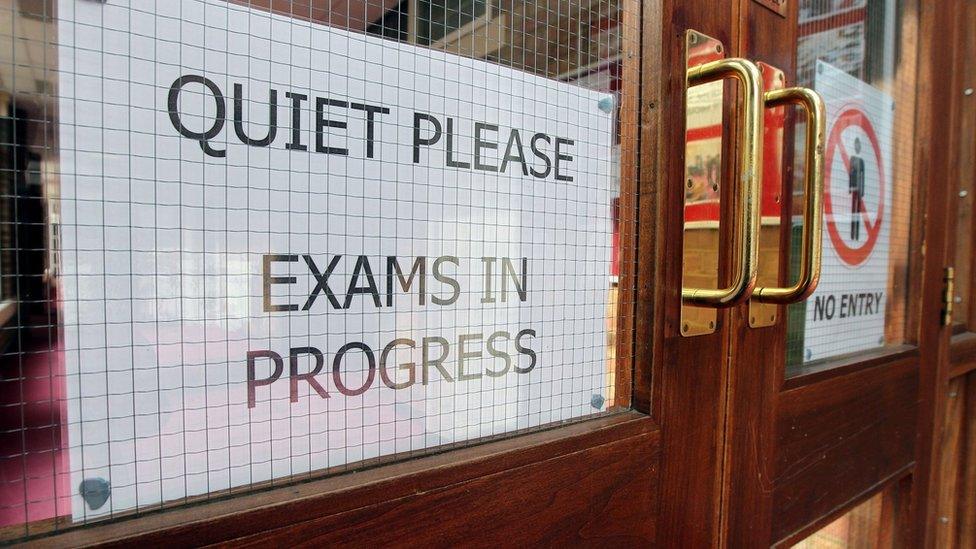Coronavirus: Remote learning for some secondary pupils in NI
- Published
- comments

Some post-primary pupils in Northern Ireland are set to move to remote learning for a period in late-January, Education Minister Peter Weir has said.
It will operate on a temporary basis for pupils in years 8-10 from 25 January for at least two weeks.
Primary schools, special schools and pupils in years 11-14 will remain in school.
But all schools will initially reopen for face-to-face learning when the new term begins next month.
On Friday, Mr Weir said schools and other education settings should reopen as planned after Christmas.
However, some teaching unions criticised the move and called on the minister to reconsider.
Outlining plans in the assembly on Monday, he said it was "abundantly clear" that schools would not return on a normal basis.
Aim to protect 'most vulnerable students'
There needed to be a "further step change" in the actions taken, he said, adding that he had made that point to other executive ministers.
"At this time and dependent upon the public health situation, I am proposing that remote learning would need to be brought in for post primaries for the non-exam year students with effect from 25 January, on a temporary basis until the end of half term," he said.
"We need to protect our most vulnerable students, and so irrespective of year group, the aim will be to keep special schools open throughout this period, and to provide provision within all schools for vulnerable children."
He said his decision to introduce some remote learning would give schools time to prepare.
Mr Weir added that his department was also considering other measures including:
Extension of the use of face coverings within post-primary schools - how compliance on face coverings and safety measures can be increased on school transport
Improving the behaviour during "drop-off and collection" of students at school gates
Exploring further rolling out test and trace capacity within schools
Improving messaging to young people about behaving safely
"This is not simply about what needs to be done for restart, but at appropriate interventions that will be needed at various times to both combat Covid and sustain education," said the minister.
Key workers
Speaking later on Radio Ulster's Evening Extra, Mr Weir said it would be difficult to provide face-to-face learning for children of key workers in years 8-10.
"I think it is going to be extremely difficult to make provision for key workers and properly do both remote learning and, for key years, continue on with face-to-face learning," he said.
"That is why with any decision there is going to be a downside and a problem."
He added: "We will try and work through anything that can be done."
Education Minister Peter Weir announces changes from 25 January
Teaching unions have criticised the ministers proposals, saying they do not go far enough.
The general secretary of the NASUWT, Patrick Roach, said: "Quite frankly this is a bizarre decision when the health minister has warned that the health system is facing higher levels of demand now than in the first wave.
"Moving immediately to remote learning could help to save lives and protect health, which surely should be the priorities at this time of increased threat to us all."
Alan Law of Nipsa said: "Schools should not re-open in January until a blended learning model is ready to commence, to do anything else is to continue to put the health, well-being and safety of staff and pupils at risk.
"The statement made in the NI Assembly today offers no comfort to anyone in the education sector and just evades all responsibility to ensure that schools are safe places where education can take place."
'Loss of learning'
Mr Weir said full school closures or interventions that reduce face-to-face teaching for students would "inevitably result in even greater loss of learning".
"I will not take action which damages the future prospects of our young people, nor will I put them at harm from a public health risk."
The focus on the return of schools and January exams comes as government's across the UK tighten Covid-19 regulations at Christmas due to a new coronavirus variant and high numbers of virus cases.
BBC News NI understands there have been a number of discussions between officials in the Departments of Education and Health on Monday, and that arrangements for the new term will come under regular review.
Pupils are facing a later return to school in 2021 in England, Scotland and Wales.
Earlier, Health Minister Robin Swann said he believed a normal return of schools is not "a sustainable position" and that his view was "informed by advice from the chief medical officer and chief scientific adviser".
Transfer test suggestion criticised
Meanwhile, in a separate development, one of the two transfer test organisations, AQE, has confirmed tests will take place in their "existing venues".
The exam board was responding to Mr Weir's comment that he would prefer pupils to sit the tests in their own primary schools.
In a statement, the organisation's board said that, as a private company, it had "no remit or authority" over primary schools.
"The assessment is scheduled to take place on the 9, 16 and 23 January in the existing venues," it said.
The other transfer test provider, PPTC, has not yet reacted to Mr Weir's comments, but its test is due to go ahead in existing test centres on 30 January, with a reserve test on 6 February.
Some primary school principal groups have been heavily critical of the minister's statement on the tests.

The Castlereagh Primary Principals' Group said they were "appalled at this eleventh-hour pronouncement" and added that the group were "tired of this shambolic, ad-hoc, make it up as you go along 'leadership'".
"At a time when principals, teachers and pupils should be relaxing and recharging their batteries after a very stressful term, the minister chooses to throw a hand grenade onto already troubled waters," it said, in a letter to the Department of Education.
"And, at the heart of this debacle are 10 and 11-year-old children and their parents."
It added that children had "already attended their familiarisation days in their chosen assessment centres".
Those criticisms were echoed by the South Belfast Primary Principals' Group, which described it as an "eleventh-hour attempt to move responsibility" for their administration of the tests onto primary schools.
In a statement, they said grammar schools had been administering the tests for many years and that the minister's suggestion was "irrational, impractical and untimely".
They called on Mr Weir to "retract his suggestions".